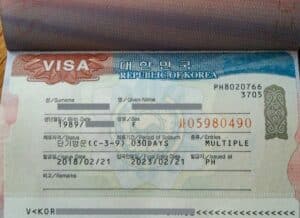In this article, we will discuss the fundamentals of applying for a permanent residency in South Korea.
If you have any questions or want to invest as an expat or high-net-worth individual, you can email me (advice@adamfayed.com) or use WhatsApp (+44-7393-450-837).
Table of Contents
Introduction
Applicants for a South Korean visa should be aware that obtaining one is not certain. The visa requirements are extremely stringent, and the application procedure can be perplexing due to the numerous options available based on what you do and require. The fees of Korean visas are the most basic component. The costs are common and are paid in US dollars, with rates ranging based on how many entries you want your visa to permit you.
If you’re applying for a permanent residence visa, you should be aware that you’ll be evaluated using an immigration point system. A point system is also in place for a particular long-term stay F-2-7 visa, which is popular among expatriates since it gives benefits that are quite comparable to those granted by permanent residence status. However, you may only stay in South Korea indefinitely if you have a permanent resident visa of the F-5 kind.
Alien Registration Card (ARC)
The majority of people who remain in South Korea for more than 6 months must get an Alien Registration Card (ARC). Expats in Korea utilize ARC as a kind of personal identification. You will receive a Resident Registration Number with this card, which is required for opening a bank account or registering at a local medical practice.

To apply for an ARC, you must make an appointment with your local Immigration Office. Every working day, they are usually open from 9:00 a.m. until 18:00 p.m. Arrive on time and bring your passport, a colored passport ID picture (3.5 mm by 4.5 mm), and any other documentation required for your visa type.
If you are unsure which papers you require, contact 1345 (in Korea) or 821345 (outside of Korea) for assistance. Make a note of the names of the papers you want in Korean, as translations may cause misunderstanding.
When applying, you must fill out an application form, which is accessible at the Immigration Office for free. Immigration of fficers are ready to assist you in filling out the form and ensuring that you have all of the necessary papers. That’s where knowing the Korean names comes in helpful, because they’ll be able to inform you if you’re missing anything.
You will have to pay an issuance fee, which is currently set at 30,000 KRW (25 USD).
Work Permits and Employment Visas
Throughout this article, different visa types will be mentioned. For reference, here is a list of visas that you can find mentioned in this article, but not discussed in length.
- E-1 Professor Visa
- E-2 Foreign Language Instructor
- E-3 Research
- E-4 Technological Guidance
- E-5 Special Profession
- E-6 Culture and Art
- E-7 Specially Designed Activities
- D-2 Student Visa
- D-5 Long-Term New Coverage
- D-6 Religious Work Visa
- D-7 Intra-company Transfer Business Visa
- D-8 Corporate Investment Business Visa
- D-9 Trade Management Business Visa
- D-10 Job Seeker Visa
Temporary and Permanent Residency in South Korea
Those interested in learning how to get a permanent residency in South Korea should be aware that, while the government makes it difficult to obtain official information, obtaining permanent residency status is not impossible. Depending on your circumstances, you may need to go through several phases of the application process, from temporary residency to applying for additional long-term possibilities until you are qualified for an unrestricted stay. A large sum of money or a marriage certificate, on the other hand, might provide you with a shortcut that will allow you to escape the lengthy application procedure.

Application Requirements for Permanent Residency in South Korea
The F-5 visa allows you to stay in South Korea permanently. To acquire it, you must meet the following qualifying requirements:
- Investing at least 600 million KRW (500,000 USD) in a Korean company and employing at least five Koreans. (Korea also offers investment visa.)
- Marrying a Korean citizen or someone who holds an F-5 visa.
- In South Korea, obtaining a degree is possible. A bachelor’s degree in science or engineering, or any master’s degree, is acceptable. You must also have lived in the country for three years and have a sufficient yearly income (greater than the country’s gross national income per capita).
- Getting a doctoral degree and a career in high-tech industry in South Korea.
- Operating a business in Korea for at least three years while on a D-8-4 start-up visa, grossing at least 300 million KRW (256,100 USD), and employing at least two Koreans for at least six months.
- Having your outstanding skill in Science, Education, Culture and the Arts, Sports, or Management acknowledged by the Ministry of Justice.
- Holding an F-2 visa for at least five years while earning enough money to sustain yourself and your family and having a basic understanding of Korean culture and traditions.
- Having had an F-4 Overseas Korean Visa for at least two years, as well as having paid adequate income or property taxes.
Before you can apply for complete permanent residency in South Korea, you must first get another F-type long-term residency visa. The F-2-7 and F-2-99 appear to be the most popular models.
Conclusion
Before finally deciding on whether to get a permanent residency in South Korea or not, consider knowing all things you need to know about life in South Korea, such as expat taxes, retirement and the cost of living in South Korea. If you want to weigh in your decisions and plan your journey well, talk to an expat advisor.
Continue to How to Get Permanent Residency in South Korea – Part 2 to learn about the three types of visas that can lead to permanent residency in South Korea.
Pained by financial indecision? Want to invest with Adam?

Adam is an internationally recognised author on financial matters, with over 760.2 million answer views on Quora.com, a widely sold book on Amazon, and a contributor on Forbes.



